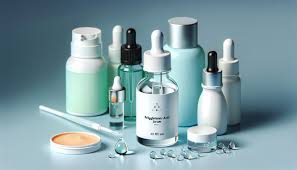
Sodium Polyglutamate in Skin Care: The Ultimate Hydration Booster
In the world of skincare, hydration is one of the most sought-after benefits, and one ingredient that’s been making significant waves recently is Sodium Polyglutamate (PGA). If you have spent any time researching high-end or advanced skincare products, you’ve likely encountered this powerhouse component. Known for its remarkable moisture retention capabilities, PGA is quickly becoming a go-to ingredient in many luxurious formulations. In fact, some studies have suggested that Sodium Polyglutamate may be even more effective than the widely adored hyaluronic acid (HA) in terms of its ability to lock in moisture. But what exactly is this ingredient, and how does it work to keep your skin looking plump, hydrated, and youthful? In this article, we will dive deep into the science behind Sodium Polyglutamate, its numerous benefits, its role in skincare, and what makes it a must-have ingredient for anyone looking to supercharge their skincare routine.
What is Sodium Polyglutamate (PGA)?
Sodium Polyglutamate is a naturally occurring biopolymer composed of repeating units of glutamic acid, which is an amino acid that is fundamental to various biological processes. The unique properties of PGA have made it a favorite in the skincare industry, as it has an extraordinary capacity to retain moisture and offer significant hydration benefits for the skin.
PGA is typically derived from the fermentation of soybeans, where specific types of bacteria naturally synthesize this compound as part of their metabolic process. While the use of fermentation in skincare is relatively common, it’s the high-performance nature of Sodium Polyglutamate that sets it apart. Unlike other humectants, PGA not only draws moisture into the skin but also works to maintain and seal it in, ensuring long-lasting hydration throughout the day.
How It Works: The Science Behind Sodium Polyglutamate
Sodium Polyglutamate’s most celebrated characteristic is its ability to function as a humectant. Humectants are ingredients that draw moisture from the surrounding environment and bind it to the skin, and PGA excels at this process. One of the most impressive aspects of Sodium Polyglutamate is its ability to retain an extraordinary amount of water. Specifically, it can hold up to 5000 times its weight in water, making it one of the most powerful hydration agents in skincare today. This level of moisture retention is unparalleled, and it is this trait that makes it so beneficial for individuals seeking lasting hydration.
However, its benefits don’t stop at moisture retention. Sodium Polyglutamate also forms a thin protective film on the surface of the skin. This barrier helps to lock in the moisture that PGA has drawn into the skin while simultaneously improving the skin’s texture, smoothness, and elasticity. This protective layer also serves as a shield against environmental stressors such as pollution, UV rays, and harsh weather conditions, offering both hydration and protection in one ingredient. As such, PGA stands out as a dual-purpose agent that not only hydrates the skin but also defends it against external damage.
In addition to these benefits, Sodium Polyglutamate plays an important role in preserving hyaluronic acid (HA) levels in the skin. HA is a naturally occurring molecule that is vital for maintaining skin hydration and elasticity. However, HA is broken down in the skin by an enzyme called hyaluronidase. PGA helps inhibit the activity of hyaluronidase, which means that hyaluronic acid can remain intact in the skin for a longer period of time, ensuring continued hydration, skin plumpness, and the reduction of fine lines and wrinkles. This makes Sodium Polyglutamate an essential ingredient in maintaining the skin’s youthful appearance.
Key Benefits of Sodium Polyglutamate in Skincare
Let’s take a closer look at the numerous benefits that make Sodium Polyglutamate a sought-after ingredient in skincare formulations:
1. Exceptional Moisture Retention
One of the main reasons why Sodium Polyglutamate is so highly regarded is its ability to hold up to 5000 times its weight in water. This makes it an incredibly effective humectant, capable of ensuring the skin stays hydrated even in the most arid environments. By continuously drawing moisture into the skin and holding it there, PGA helps keep the skin feeling plump, smooth, and healthy-looking.
2. Inhibits Hyaluronidase
PGA goes above and beyond by inhibiting the activity of hyaluronidase, the enzyme that breaks down hyaluronic acid in the skin. Since hyaluronic acid plays a crucial role in maintaining skin hydration and elasticity, preventing its breakdown is a significant advantage. By blocking hyaluronidase, Sodium Polyglutamate helps maintain the skin’s HA levels, providing long-lasting hydration and giving the skin a firmer, more youthful appearance.
3. Improved Skin Elasticity
Regular use of products containing Sodium Polyglutamate can significantly improve skin elasticity. As the skin becomes better hydrated, it naturally appears firmer and more resilient, leading to a reduction in fine lines and sagging. This can be especially beneficial for individuals with mature or aging skin, as the hydration provided by PGA helps restore some of the skin’s youthful vitality.
4. Creates a Protective Film
Another key benefit of Sodium Polyglutamate is its ability to form a protective barrier on the skin’s surface. This protective film serves to lock in moisture, preventing dehydration throughout the day, while also protecting the skin from external stressors like pollution, UV rays, and harsh weather conditions. This makes PGA not only a hydration powerhouse but also a protective agent that helps preserve the skin’s health over time.
5. Compatibility with Other Ingredients
Sodium Polyglutamate is highly versatile and works well in combination with other skincare ingredients. This makes it an ideal addition to various types of formulations, including moisturizers, serums, sunscreens, and anti-aging treatments. It can enhance the effectiveness of other humectants like glycerin or hyaluronic acid, making it a popular choice in advanced skincare products.
Is Sodium Polyglutamate Safe for Your Skin?
When it comes to safety, Sodium Polyglutamate is generally considered to be safe and well-tolerated by most skin types. It has a low risk of irritation, which is why it’s commonly found in skincare products for sensitive skin. According to the Environmental Working Group (EWG), Sodium Polyglutamate has been rated as a low-risk ingredient with a safety rating of 1, indicating that it is non-toxic and unlikely to cause harm.
That being said, as with any new ingredient, there are a few considerations to keep in mind:
Sensitive Skin: While rare, some individuals with extremely sensitive skin may experience mild irritation. If you have sensitive skin, it’s always a good idea to patch-test any product containing Sodium Polyglutamate before applying it to your face to ensure there is no adverse reaction.
Overhydration: In highly humid environments, using too many humectants, including Sodium Polyglutamate, could potentially lead to overhydration. This may cause temporary puffiness or swelling, particularly under the eyes. However, this issue is typically short-lived and resolves once moisture levels stabilize.
Where Can You Find Sodium Polyglutamate?
Currently, Sodium Polyglutamate is still considered a premium ingredient, so it is typically found in high-end or advanced skincare products. Brands like Neocutis have incorporated PGA into their hyaluronic acid serums to enhance the hydration and skin elasticity effects. While it is not yet as ubiquitous as hyaluronic acid, its growing popularity is leading to its inclusion in more products, particularly those aimed at providing intense hydration, anti-aging, and skin protection.
Recent Research on Sodium Polyglutamate
Recent studies have reinforced the efficacy of Sodium Polyglutamate as a superior skincare ingredient. Research conducted by Serra et al. (2024) highlighted how PGA outperforms even hyaluronic acid in terms of moisture retention. Moreover, studies like those conducted by Liu et al. (2022) have demonstrated that PGA can inhibit the activity of hyaluronidase, further enhancing its long-lasting hydration benefits.
In addition to its hydration benefits, Sodium Polyglutamate has been shown to offer protective properties that help prevent environmental damage. This means that it not only supports hydration but also plays a significant role in reducing the visible signs of aging by preventing moisture loss and supporting the skin’s natural defenses.
Should You Incorporate Sodium Polyglutamate into Your Routine?
If you’re seeking a high-performance hydrating ingredient that keeps your skin plump, smooth, and youthful, Sodium Polyglutamate is certainly worth considering. It’s particularly beneficial for those with dry, dehydrated, or mature skin who are looking for long-lasting hydration. Its ability to maintain moisture levels, improve skin elasticity, and protect the skin makes it an excellent addition to your skincare routine.
However, individuals with oily or acne-prone skin should use Sodium Polyglutamate more cautiously. Humectants like PGA can sometimes draw in excess moisture in humid environments, potentially leading to breakouts or puffiness. Therefore, if you fall into this category, you may want to use it sparingly or opt for formulations designed specifically for oily or acne-prone skin.
Conclusion
Sodium Polyglutamate is quickly becoming a standout ingredient in the skincare world. With its exceptional moisture retention properties, ability to inhibit hyaluronidase, and capacity to improve skin elasticity, it’s clear why this ingredient is gaining so much attention. Whether you’re looking for a product to enhance hydration, boost skin protection, or fight signs of aging, PGA is a versatile and powerful ingredient to consider. With its growing presence in advanced skincare formulations, Sodium Polyglutamate is certainly one to watch as it continues to revolutionize the way we approach skincare.


